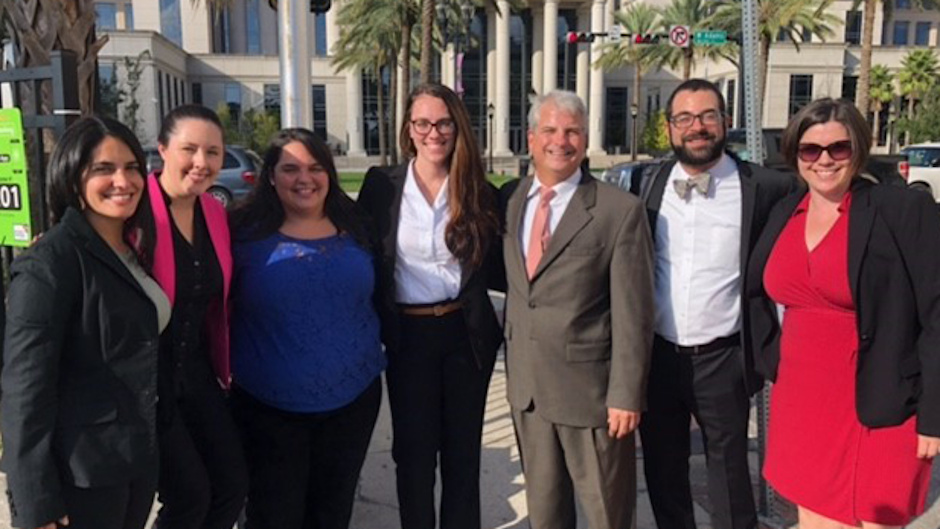In the early morning hours of September 26, 2018, Dustin Duty was shackled and transported to the Jacksonville courthouse to attend a new hearing he had waited years to attend. After years of desperation, isolation, and many days where he felt there was no hope, Duty, now thirty-four years old, and a client of the University of Miami Innocence Clinic, would have one final chance at seeking justice and overturning his wrongful conviction.
Conviction of 20 Years Based on Faulty Evidence
Mr. Duty was wrongfully convicted, more than four years ago, for a strong-arm robbery he did not commit. His case lived and died on one faulty piece of evidence: a mistaken identification by a sole witness in a moment of distress. “Eyewitness identification is the leading cause of wrongful convictions nationwide,” said Clinic Director, Craig Trocino.
In Duty’s case, there existed no physical evidence, or any evidence, to corroborate this identification. In fact, when Duty was arrested he did not match any of the descriptors given by the victim to the police of her perpetrator. Nevertheless, a jury found the identification to be sufficient to convict Mr. Duty, and he was sentenced to twenty years in prison.
Reaching Out to Miami Law, Clinic Takes Action
In 2016, Duty wrote letters begging the University of Miami Innocence Clinic to take on his case and prove his innocence as the Clinic is dedicated to identifying and correcting wrongful convictions and to exonerating innocent individuals and combating injustice.
When Duty's letters arrived his case was assigned to a law student, Lauren Van Buren, J.D ’18. After months of thorough legal research and investigation, she submitted a post-conviction motion seeking relief for Duty under the direction of Clinic Director Craig Trocino, and with the assistance of Leticia Mora, J.D. ‘17.
Clinic Student’s Post-Conviction Motion is Successful
A post-conviction motion is a tool lawyers use when a criminal case did not turn out as desired and addresses issues that may or may not have been clear by a review of the trial transcripts and record. The motion and the claims Van Buren drafted were so compelling that the Duval County State Attorney's stipulated to an evidentiary hearing on the matter (at an evidentiary hearing, one can present evidence, testimony, and argument at this hearing as to why a conviction should be overturned).
As the hearing approached, the two alumnae who worked on the case, Van Buren and Mora, arranged to take time from their law practices to travel to Jacksonville to attend the hearing. “It is beyond gratifying to have such committed students whose dedication continues long after graduation,” Trocino said.
Cross-Examination at Evidentiary Hearing
On the day of the hearing, three witnesses were called to testify. First was the victim who expressed her uncertainty in her identification then and now.
Second was an alibi witness for Duty whom Duty’s attorney failed to call as a witness at Mr. Duty's original trial and who could place Duty somewhere other than the scene of the crime when the crime occurred.
Lastly, was Duty's trial attorney, a Jacksonville Assistant Public Defender whom Duty claims was ineffective in failing to call an essential alibi witness, in not moving to suppress the overly suggestive identification pre-trial, and in failing to impeach a detective with critical evidence.
Professor Craig Trocino, along with Seth Miller from the Innocence Project of Florida, partnered together to deliver an effective and zealous cross examination of the three witnesses and are in the process of submitting closing statements. The current clinic students who could not attend the hearing, have helped in an amazing way and continue to work diligently on the closing memorandum.
Awaiting Judge’s Ruling and a New Trial
The UM Innocence Clinic is hopeful Duty is able to find the justice he deserves after the Judge renders her decision on whether or not to grant him a new trial in the coming months.
In the meantime, the Clinic is continuing to assist other wrongfully convicted individuals, like Duty, who remain incarcerated for crimes they did not commit.
More on the University of Miami Innocence Clinic

